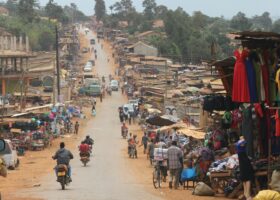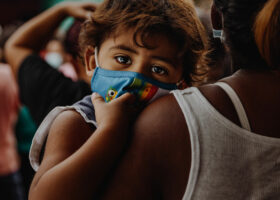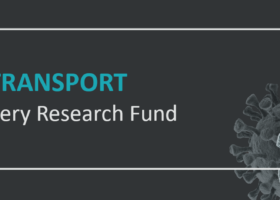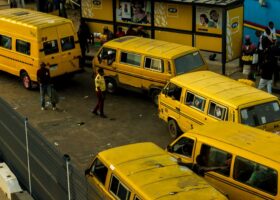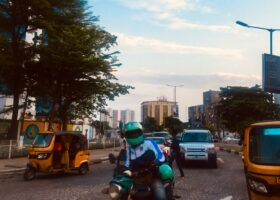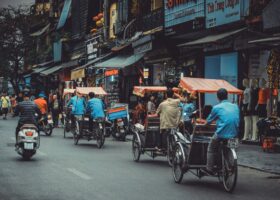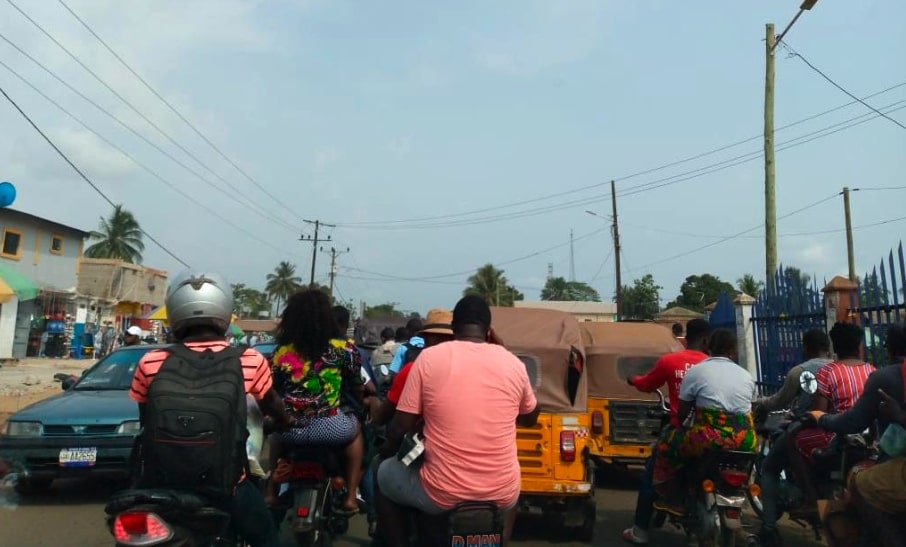
Overview
The outbreak of the COVID-19 epidemic and the various measures put in place to mitigate its spread had a considerable impact on the urban transport sector. This report presents and assesses the findings of a survey of close to 70 motor-tricycle taxi operators and 12 key stakeholder interviews conducted in Nairobi and Kisumu, Kenya. The main purpose is to provide evidence-based inputs to policy formulation.
Publications with the same themes
Publications with the same study countries
Related news & events
News
News
News
News
News
News
News
News
Blog
Blog
News
News
Blog
Blog
PDF content (text-only)
COVID -19 Response & Recovery Transport Re search Fund
Accelerating COVID -19 related ‘best practice’ in the
urban motorcycle taxi sector in S ub -Saharan Africa
Country Report: Liberia
Jul y 2021
HVT029.L3L119 – Swansea University This research was funded by UKAID through the UK Foreign, Commonwealth & Development Office under
the High -Volume Transport Applied Research Programme, managed by IMC Worldwide.
The views expressed in this country report are those of the authors and do no t necessarily reflect the UK
government’s official policies, nor those of any individuals and organisations referred to in this country
report .
IMC Worldwide Ltd, the HVT Programme , and the UK government shall not assume any responsibility for the
results of works based on the use of this report . Users accept this publication as a guidance document only.
Users accept that they need to take their own technical and legal advice before issuing Agreements, Terms
and Conditions , and other legally binding docume ntation related to implementing any recommendations.
Reference No. HVT 029.L 3L119
Lead Organisation/ Consultant Swansea University
Partner Organisation(s)/
Consultant(s)
Lofa Integrated Development Association (LIDA) , African Methodist Episcopal
University (AMEU)
Title Accelerating COVID -19 related ‘best practice’ in the urban motorcycle taxi
sector in Sub -Saharan Africa – Liberia Country Report
Type of document Project Report
Theme Urban transport
Sub -theme Policy Regulation
Author(s) Ted Johnson , Dr Rosemarie T. Santos , Krijn Peters
Lead contact Krijn Peters
Geographical Location(s) Liberia
Abstract
The outbreak of the COVID -19 epidemic and the various measures put in place to mitigate its spread had a
considerable impact on the urban transport sector.
This report presents and assesses the findings of approximately 12 0 motorcycle and motor -tricycle taxi operators and
approximat ely 15 key stakeholder interviews conducted in the cities of Monrovia and Ganta , Liberia . The main
purpose of the report is to provide evidence -based inputs to policy formulation.
Keywords Urban transport, motorcycle taxi sector, COVID -19 , intermediate forms of
transport , Liberia, West Africa, best practice
Funding UKAid/ FCDO
Acknowledgements
Cover Photo Credit: Ted Johnson i
Accelerating COVID -19 related ‘best practice’ in the urban motorcycle taxi sector in Sub-Saharan Africa :
Liberia Country Report
CONTENTS
Executive Summary iii
1. Introduction 1
1.1 Project aims and objectives 1
1.2 Transport challenges being addressed during and after COVID -19 1
2. Methodology 2
2.1 Summary of approach 2
2.2 Detailed methodology 2
3. Liberia context 3
3.1 COVID -19 in Liberia 3
3.2 COVID -19 and urban transport measures 4
3.3 Motorcycle and motor -tricycle taxi sector 5
4. Perspective of key stakeholders on COVID -19 and the motorcycle/ motor -tricycle taxi
sector 5
4.1 Impacts of COVID -19 on urban transport 5
4.2 Impact of transport -related measures and consultations with the sector 5
4.3 Social or technological adaptations made by motorcycle taxi operators 6
4.4 Useful lessons fro m previous health crises 6
4.5 Motorcycle taxis as a low -risk means of transport? 7
5. Motorcycle taxi survey findings 7
5.1 Findings 7
6. Conclusion 10
7. Bibliography 11
APPENDICES
Appendix A: Key stakeholders interviewed 12
Appendix B: Key stakeholder interview questions 13
Appendix C: Motorcycle/ tricycle operator questions 15
FIGURES
Figure 1: Restrictions introduced during lockdown 7
Figure 2: Extent of adherence to COVID -19 regulations 8
Figure 3: Level of consultation on COVID -19 regulations 9
Figure 4: Clarity of communication on COVID -19 regulations 9 ii
Accelerating COVID -19 related ‘best practice’ in the urban motorcycle taxi sector in Sub-Saharan Africa :
Liberia Country Report
ACRONYMS
CBL Central Bank of Liberia
COHFSD COVID -19 Household Food Support Program
COVID -19 Corona virus Disease
ECOWAS Economic Community of West African States
EU European Union
EVD Ebola Virus Disease
FRTUL Federal Transport Union of Liberia
GoL Government of Liberia
HVT High Volume Transport Applied Research Programme
IMC IMC Worldwide Ltd
IMF International Monetary Fund
LEU Liberia Economic Update
LISGIS Liberia Institute for Statistics and Geo -Information Services
L$ Liberian Dollar
LIC Low -income country
LMTU Liberia Motor -taxi Union
MRTU Mano River Transport Union
MCT Motorcycle Taxi
MIC Middle -income country
MOH Ministry of Health
MTT Motor -tricycle Taxi
NTA National Transport Authority
OMEHPRO Organization for Mental Health Promotion
PPE Personal Protective Equipment
SPACOC Special Presidential Advisory Committee on Coronavirus
UCDTU United Congress Driver Transport Union iii
Accelerating COVID -19 related ‘best practice’ in the urban motorcycle taxi sector in Sub-Saharan Africa :
Liberia Country Report
EXECUTIVE SUMMARY
This country report details the findings of a study on the impact of the COVID -19 outbreak on the urban and
peri -urban motorcycle/ tricycle taxi (MCT/ MTT) sector in Liberia . Urban motorcycle/ tricycle taxi operators in
Liberia provide essential transport services .
The repo rt highlights the restrictions and mechanisms put in place to mitigate the spread of COVID -19
relevant to this sector and explore s motorcycle/ tricycle taxi operators’ perceptions of the acceptability of
these restrictions , as well as the extent to which they feel their sector has ad opted and adhered to them.
For this report, primary data was collected in two cities: Paynesville (on the outskirts of Monrovia) and Ganta
City , a city in the interior close to the border with Guinea . Both quantitative and qualitative approach es were
utili sed. Fifteen key informants (KIs)/ stakeholders in the transport sector were interviewed and a survey
questionnaire was conducted with 12 0 motorcycle taxi and motor -tricycle taxi operators.
Country findin gs were presented to and discussed among the key stakeholders in a series of (online)
workshops. The results of this report – together with similar research activities in five other Sub -Saharan
African countries – have been used for an aggregated report an d policy brief on the impact of the COVID -19
outbreak on the urban motorcycle / tricycle taxi sector in Sub -Saharan Africa.
Key facts
• In the first 12 months of the COVID -19 epidemic in Liberia , just over 2,0 00 positive COVID -19 cases were
recorded , with just over 85 deaths ;
• The Government responded with a series of measures, which included physical distancing, restrictions on
non -essential travel , and a 21 -day lockdown ;
• Public transport providers were forced to limit passenger numbers, to comply wit h physical distancing
regulations, and were required to wear facemasks .
Key findings
• The stringent enforcement of lockdown restrictions and stay -at-home order s prompted motor cycle -taxi
operators to increase passenger fares ;
• Social and technological innovat ion s made by MCT operators were limited , and as per advised by the
Ministry of Health (Mo H) to follow universal health protocols such as physical -distancing, wearing of face -
masks, using hand saniti sers , and li miting the number of passengers per journey ;
• The refusal o f some MCT operators to wear helmet s as a safety precaution was predomina ntly based on
the widespread perception of passengers that MCT drivers who are wearing a helmet are out of town
MCT operators , concealing their identity because they are up to no good;
• Stakeholders generally expressed th e belie f that motor cycle taxis are the least likel y to transmit COVID -
19 , from all the various public transport means;
• The adherence of the M CT operators to the restrictions was more stringent in the prima ry city (Monrovia /
Paynesville) than in the secondary city (Ganta) .
Key recommendations
• En forcement of the restrictions on transport services was mostly done by the police traffic enforcers ,
pa rticularly in the primary city , while p eer pressure from fellow MCT operators and self -compliance were
more prominent in the secondary city . This suggests that a tailor -made approach, rather than a ‘one -size -
fits all’ approach would be the most effective i n achieving compliance with restrictions ;
• Limiting the number of passengers, wearing face -masks and washing hands or using hand saniti sers were
the most common social / technological measures used by the MCT operators . With emergency economic
support for the MCT / MTT operators, more of them would have been able to adhere to the measures and
for a longer period; iv
Accelerating COVID -19 related ‘best practice’ in the urban motorcycle taxi sector in Sub-Saharan Africa :
Liberia Country Report
• MCT operators in both cities place d their trust in the Ministry of Health / health authorities regarding
COVID -19 restrictions and measures. Further opportunities for cooperation between the MCT / MTT
unions and the MoH can and should therefore be explored. 1
Accelerating COVID -19 related ‘best practice’ in the urban motorcycle taxi sector in Sub-Saharan Africa :
Liberia Country Report
1. Introduction
In the last 25 years or so, motorcycle taxis (MCTs) – and more recently motor -tricycle taxis (MTTs) – have
fundamentally changed mobility and access in urban Sub -Saharan Africa, providing rapid and door -to-door
transport, supporting livelihood activities, and facilitating access to essential services, such as health, markets
and education. In many African cities, motorcycle taxis – often referred to as Okadas in West Africa or Boda -
Bodas in East Africa – are responsible for the majority of transport movemen ts of both people and goods and
provide hundreds of thousands of jobs to low -skilled and/or marginalised youth.
During the recent COVID -19 epidemic, urban motorcycle/ tricycle taxi operators provided essential services,
including to key health -workers, bu t also experienced risks of contracting the virus and spreading it, due to
their close and multiple interactions with customers. Understanding the impact of COVID -19 – and of the
measures taken to mitigate the spread of the virus – on this widespread inter mediate form of transport is
crucial for planning, managing and operating urban transport services, so that essential services remain
accessible for urban dwellers during periods of lockdown or curfews.
While MCT operators have in many cases shown ingenui ty and an ability to adapt and innovate when
responding to different (health) challenges, policy -makers and regulators often remain somewhat unwilling to
engage with (or are even hostile to) the – often informal – motorcycle taxi sector. Furthermore, becau se of
the intermediate and informal nature of the motorcycle taxi sector, policymakers, urban planners and
transport regulators tend to overlook its role and potential (as a force for good / support but equally as a
factor in further spreading COVID -19) or are not sure how to engage with the sector and its representatives.
Prior to the COVID -19 pandemic, many of the measures taken by African cities to curb or even completely ban
motorcycle taxi riding ignored the essential services they deliver and seem to b e mainly a response to the
rising number of traffic accidents involving or caused by motorcycle taxi riders. The rapid spread of urban
motorcycle taxis does pose a series of challenges. Bringing motorcycle taxi operators / unions and key
stakeholders in urb an (health) planning and transport together will be essential for the future sustainable
socio -economic and environmental development of SSA’s cities.
1.1 Project aims and objectives
The aim of the project Accelerating COVID -19 related ‘best practice’ in the urban motorcycle taxi sector in Sub -
Saharan Africa is to improve understanding of the impact of the COVID -19 outbreak (including the measures
and restrictions put in place to reduce its spread) on the urban motorcycle taxi sector in Sub -Saharan Africa
(SS A), via case studies of three West African countries (Sierra Leone, Liberia and Ghana) and three East African
countries (Uganda, Kenya and Tanzania). This report analyses and communicates the data and findings for
Liberia.
Knowledge (including false/ inef fective ‘knowledge’) about how to reduce the chance of COVID -19 infection,
through behaviour changes and/or social and technical innovations, may be shared spontaneously among
individuals or small groups of riders. However there is limited opportunity to s hare best practices between
motorcycle taxi operators in different cities or between different LICs (and lower MICs). This study’s objective,
therefore, was to share the findings, best practices, and any social and technological innovations developed /
adap ted by motorcycle taxi operators to mitigate the impact of COVID -19. It was intended that by sharing
them with urban motorcycle taxi operators and key stakeholders, including policymakers, this would allow for
evidence -based rapid interventions. This was d one via workshops, a sharing platform freely accessible to all
relevant beneficiaries and key stakeholders, and one generic policy brief, together allowing for intra -city,
inter -city and international peer -to-peer learning and knowledge exchange.
1.2 Transport challenge s being addressed during and after COVID -19
Motorcycle taxis play a pivotal role in the provision of urban transport. However, relations and trust between
the concerned authorities and motorcycle taxi operators/ unions can be strained at times, possibly affecting
the effectiveness of COVID -19 measures and restrictions. This research established:
• If and how the COVID -19 pandemic has affected urban motorcycle taxi services in general; 2
Accelerating COVID -19 related ‘best practice’ in the urban motorcycle taxi sector in Sub-Saharan Africa :
Liberia Country Report
• If motorcycle taxi operators or unions have been consulted in the COVID -19 measures taken, and what
their level of compliance with these has been (including reasons for limited or non -compliance); and
• Social and technological measures and innovations motorcycle taxi operators have int roduced to limit
infection by or spread of COVID -19.
2. Methodology
2.1 Summary of approach
This project used a mixed -methods research approach, divided into three key activities or work -packages. The
three work packages set out below allowed us to collect important data to answer the various research
questions, to create opportunities for the key stakeholders and beneficiaries to discuss and access the
findings in user -friendly formats, and to learn from peers across different countries and regions. The approach
has high utility due to the multiple opportunities created for peer -to-peer and peer -to-stakeholder learning,
as well as for knowledge exchange at an intra -city, inter -city, inter -national and virtual levels.
2.1.1 Work Package 1: Dat a collection
In each of the study’s case countries, data were collected through key informant interviews and motorcycle
taxi/ motor tricycle taxi operator surveys in two cities.
2.1.2 Work Package 2: Sharing of findings
Data findings, including responses and socio -technological innovations, were discussed in country -level Focus
Group Discussions (FGDs) between the country researcher, key stakeholders, and representatives of the
beneficiaries. Due to ongoing COVID -19 restrictions in the case -study countries, typically the number of
participants in these FDGs had to be limited to comply with regulations.
2.1.3 Work Package 3: Feeding back findings from regional wo rkshops
Findings from the country studies and FGDs were presented at a webinar on 16 April 2021. The webinar
participants included the various country researchers and key stakeholders (from all six case -study countries)
such as representatives of MCT unions; traffic police; representatives from ministries of health (and other
relevant ministries); market b oard members; city council representatives; transport sector regulatory bodies;
and urban planning departments. The key stakeholders were identified by the country researcher based on a
country specific literature review at the start of the project. A webs ite and online open -access sharing
platform will be developed on which the study’s findings will be shown, including short videos (of one to two
minutes in duration) of MCT operators explaining COVID -19 related challenges they have experienced and
how they have overcome these.
2.2 Detailed methodology
Data were collected through a mixture of semi -structured qualitative interviews and short surveys. The
research objectives set out in the section above were operationalised in five open -ended qualitative questions
that were asked to the key informants / key stakeholders (see A ppendix B for the stakeholder interview form).
For each case study country approximately 15 key informants were interviewed (see A ppendix A for a list of
interviewed stakeholders). The question s asked were:
1. What have been the impacts / effects of COVID -19 on urban transport in general and the motorcycle
taxi (MCT) sector specifically?
2. If transport -related restrictions or a lockdown were introduced, what were the specifics of these, to
what exten t have motorcycle taxi unions and/or riders consulted in this, and to what extent have MCT
riders complied with these?
3. Are there any social or technological innovations or adaptions MCT riders can take (or have taken) to
reduce exposure and limit the sprea d of COVID -19?
4. Have experiences with and responses to previous outbreaks / pandemics been used when addressing
the current COVID -19 outbreak (for Sierra Leone and Liberia, think Ebola; for other countries, think for
instance of tuberculosis, feared to be sp read by using shared helmets)? 3
Accelerating COVID -19 related ‘best practice’ in the urban motorcycle taxi sector in Sub-Saharan Africa :
Liberia Country Report
5. If motorcycle taxi transport, from all the modes of public transport (shared -car taxis, mini - and midi -
buses, etc.) poses the lowest risk of COVID transmission, do you think that motorcycle taxi transport
should be promoted?
In addition, further survey questions were designed to provide more quantitative data on these five topics.
While some of these survey questions were in a simple ‘yes/no’ format, others used a Likert scale or provided
multiple answers to choose from. MCT/ MTT operators were surveyed in two cities in each of our six study
countries, with a total of 60 surveys per country. 1 The full research instrument is included in A ppendix C to
this report. Since the MCT surveys were (largely) standardised across the 12 l ocations (two urban settings in
six countries), this resulted in an aggregated ‘bank’ of about 360 surveys. As can happen when conducting
surveys in large numbers, in a few cases one or more questions were not answered or correctly recorded. If ,
and when t his happened, it is reflected in the graphs via the N number.
While 60 to 80 surveys can hardly be considered as sufficient for a meaningful quantitative analysis on its
own, it is believed by the researchers that because of the way in which surveys were c onducted (as described
in the above paragraph), together with the key stakeholder interviews, that the data provides insight on par
with what would be expected from a rapid appraisal method, for instance. The qualitative and quantitative
data, plus the lit erature reviews, allowed for some level of triangulation to assess the validity of claims and
findings.
3. Liberia context
This section provides a short overview of the first eight months of the COVID -19 epidemic in Liberia and how
it impacted the country’s transport sector.
3.1 COVID -19 in Liberia
The first COVID -19 case in Liberia – a local government official returning from abroad – was confirmed on 16 th
March 2020. The following day, 17 th March 2020 , close contact s of the first case also tested positive. On 20 th
March, a third positive case was confirmed , again someone who had returned from abroad. Following this
third case, a 21 -day lockdown in Montserrado and Margibi counties was imposed, and the Ministry of Health
and Soc ial Welfare declared a national health emergency on 22 nd March 2020 (1) . On 8 th April 2020 , President
George Weah extended the reach of the lockdown, declaring a three -week nationwide lockdown . This
included travel restrictions, curfews and the closure of non -essential businesses and institutions , such as
schools, government offices, mosques and churches (2) . Lockdowns were extended and at times enforced by
police using force , when numbers of infections continued to increase (3) .
Meanwhile, t he continuous increase of positive cases in the country prompted the US and German embass ies ,
together with the European Union , to organi se a charter flight to evacuat e its citizens. The Government of
Liberia , alarmed by the quick evacuation of the foreign nat ionals , create d the position of “National Response
Coordinator for the Executive Committee on Coronavirus â€.
In the subsequent months, the pandemic took its toll, with a range of consequences: the special senatorial
elections and a national referendum were both delayed (4) and the economy suffered significantly , resulting
in a projected gross domestic product (GDP) contraction of 2.6% (5) . The legislature approved a $25 million
USD stimulus package to provide food for vulnerable communities i n collaboration with the World Food
Program me , to provide loans to vulnerable traders, and to pay utility bills for some households, among other
things (6) . However, the COVID -19 National Steering Committee admitted that it had done a poor job in
deliverin g relief packages, blaming bad roads and other factors (7).
According to the first Liberia Economic Update, the virus has hit Liberia with a human and economic impact
that will be challenging for the country. Real GDP is expected to contract by 2.6 % for t he year 2020. At the
moment, the percentage of people living below the poverty line stands at just over 55% (2019) but this could
increase to nearly 70%. That is, more than half a million additional Liberians could slip below the poverty line .
1 Due to miscommunication, the Liberia team conducted 60 MCT/ MTT surveys per city, resulting in 120 surveys in total rather than
60. 4
Accelerating COVID -19 related ‘best practice’ in the urban motorcycle taxi sector in Sub-Saharan Africa :
Liberia Country Report
Without proper policy responses, or if these responses are delayed, there is a real chance – according to the
authors of the Update – that economic growth c ould be further reduced .
According to the World Bank: “Under the baseline scenario, a sharp rebound is expected with real GDP growth
projected to rise to an average of 4.1 % during 2021 -22. However, under the downside scenario, real GDP is
expected to recover more slowly, growing at an average rate of 3.7 % in 2021 -22 †(5) . Whichever scenario will
materiali se, in the medium -term the country’s recovery will be determined by the exten t to which : “economic
activity and the implementation of structural reforms designed to alleviate constraints on productivity growth
and support economic diversification will take place, post -COVID -19†(5) .
Liberia was widely praised for how it responded to the threat posed by COVID -19 . Drawing from its
experience with the recent Ebola pandemic, the government acted swiftly with measures to prevent the
spread of COVID -19 . A key action included the creation of a Special Presidential Advisory Committee on
Coronavirus (SPACOC) set up well ahead of the first recorded case in the country. Liberia was one of the first
countries to start screening passengers for COVID -19 at airports (8) .
Prevention and detection mechanisms were put in place to curb the spread of the virus, which include d
frequent hand washing with soap and water , p romoting physical distancing , and c ontact tracing and testing .
Liberia experienced two civil wars (1989 -1996 and 1999 -2003) which brought the country to its knees.
Recovery i s still ongoing . As the World Bank explains, "Large macro -economic imbalances, limited fiscal space,
and low foreign -exchange reserves constrain the gove rnment’s options for addressing the COVID -19 crisis.
Pervasive informality intensifies the economy’s exposure to shocks and complicates any potential policy
response, while poor health indicators, weak public health systems, and high levels of food insecur ity and
malnutrition increase the population’s vulnerability to COVID -19 †(9) . Furthermore: “R educed regional and
international travel due to a combination of behavioral changes and preventive measures, including the
closure of Roberts International Airport since 23 rdMarch 2020 , are directly affecting the transportation and
hospitality industries, which account for about 20 % of Liberia’s GDP. Reduced travel is having an adverse
spillover effect on local supply chains, with negative implications for employment, income, and government
revenue †(9) .
3.2 COVID -19 and urban transport measures
Most people in Liberia do not own conventional and/or intermediate modes of transport but use public
transport services that are generally provided by i ndividual private operators . Taxis, minibuses , pick -ups , and
trucks provide public transport services between Monrovia and the counties. Recently, the NTA (operating
conventional buses) has resume d operations to count y capitals. Int racity transport in almost all of Liberia’s
towns and cities is done by motor cycle taxi or motor -tricycle taxi , including the transport ation of goods to
markets and people to schools, work , and other social services. Increasingly, shorter inter -city transport can
also take place by intermediate forms of transport .
In Monrovia, car taxis, motor cycle taxis , conventional buses and mini -buse s provide public transport services
to an estimated 1.5 million people. Taxis and buses just provide services along the main city routes towards
the city centre (10). At the start of the motorcycle taxi boom, a JICA stud y found that t axis (shared) ma de up
53% of the transport services along the main route, walking 25%, buses and private cars 8% each, followed by
motor cycle taxis 5% and truck s 2% (11) . Now, the number of journeys made by motorcycle taxi or motor -
tricycle taxi has increased exponentially.
Since the start of the COVID -19 pandemic, towns and cities ha ve experienced a number of restrictions on
public transport . These were put in place to limit transmission of the virus and to provide the safe passage of
key workers during the emergency response. Some operators, and in particular many of the motorcycle taxi
operators , defied the restrictions by the government , arguing that it would be extremely challenging to
foresee in their livelihoods if following the capacity restrictions .
In response to the difficulties faced by the operators to sustain their livelihoods and in recognition of the
crucial role the sector plays in transporting key workers and supplies specifically, and the population mor e
general ly, the Ministry of Transport and MCT Unions focused on making the sector more compliant and safer
via awareness -raising, using radio announcements and dramati sations to spread health messages . 5
Accelerating COVID -19 related ‘best practice’ in the urban motorcycle taxi sector in Sub-Saharan Africa :
Liberia Country Report
3.3 Motorcycle and motor -tricycle taxi sector
Motorcycle taxis first appeared in Liberia in the capital Monrovia and later spread to the main regional towns
before spreading to rural areas. The early entrants to the new motorcycle taxi profession were ex -combatants
from all armed factions who sought t o make a living in the larger towns, although the pull of the motorcycle
taxi profession broadened quickly after the immediate post -war period: drawing in new riders who were not
ex -combatants, but who simply resorted to the profession due to a lack of oth er employment opportunities.
In 2012, the number of young people working in Liberia as motorcycle taxi riders, or in an auxiliary capacity as
mechanics, bike washers, fuel sellers, etc. , was estimated at 500,000 (12). This number – if correct - may have
increased further in recent years. In the last four to five years, there has also been an introduction and
explosive growth of three -wheeler ‘auto -rickshaws’, known locally as ‘ Kekeh’ , stimulated by the prohibition of
motorcycle taxis from operating on Monr ovia’s major arterial routes (13). The motor tricycle’s rapid growth in
popularity has been assisted by the fact that it is cheap, and it offer s the passenger(s) some form of
protection against the elements , as well as road traffic accidents (13).
4. Perspective of key stakeholders on COVID -19 and the motorcycle / motor -tricycle
taxi sector
This chapter discusses the data collected through interviews with the 15 key informants / stakeholders. A full
list of key stakeholders interviewed is presented in Appendix A; these include d Ministry of Transport (MOT)
representatives , traffic police representatives, health workers, federal transport union, tricycle motorcycle
association, motorcycle taxi union representatives, market women , and others. The chapter is organised
according to the five semi -structured questions that were asked to the key informants.
4.1 Impacts of COVID -19 on urban transport
Most informants noted that COVID -19 has negative ly impact ed the urban public transport sector. This was
mainly attributed to reduced economic activity due to the partial lockdowns and curfew. Some sectors of the
economy like hotels and r estaurants; sports and recreational activities; and places of worship were initially
closed completely, resulting in reduced demand for transport services. Further more , the government
encouraged people to work from home whenever possible, reducing demand f or transport services . This was
observed by an MCT Union Leader :
“The frequency of ridership is significantly down, and no passengers are coming out due to the
lockdown †– Motorcycle Taxi Union Leader.
The government ’s 21 -day restriction and the imposition of a curfew led to a reduc tion in the number of
motorcycle taxi passengers , directly affect ing the livelihoods of the MCT operators. Union leaders indicated
that this resulted in operators being left without any other choice than to stop operating on the less viable
routes and/or passing on the costs to their customers. Due to a reduction in movements, market vendors
were forced to close thei r small businesses. One of the union leader s confirmed this :
“Fewer rides and low income makes our family suffer because the government do esn’t care at all
[about] the drivers like us †– Motorcycle Taxi Union Leader .
Furthermore, the long -term closure of schools , hotels, restaurants , and other public and private businesses ,
had a devastating effect on socioeconomic activities and o n demand for transport services.
4.2 Impact of transport -related measures and consultations with the sector
As early as April 2020 , Liberia had already implemented several health measures, including bans on public
gatherings, increased health screenings at ports, restrictions on ship berthing and crew access to the shore,
reducing passengers on both public and private means of transpo rt, physical distancing in public place s, and
lockdowns.
The extent to which the providers of intermediate modes of transport were informed on time , let alone
consulted in the measure s introduced, was limited: 6
Accelerating COVID -19 related ‘best practice’ in the urban motorcycle taxi sector in Sub-Saharan Africa :
Liberia Country Report
“The lockdown pronouncement of the government was very swift and some of the MCT unions and
drivers were not informed , thus’ drivers continue to driv e†– Keh -Keh (motor -tricycle taxi) operator .
The lack of awareness -raising concerning the restrictions and lockdown resulted in some operator s being
caught unaware of the new policies . This was corroborated by one of the union leaders, who stated:
“There are some instances that lockdown restrictions were not observed especially in the village and
off -road areas, due to lack of awareness †– Motorcycle Taxi Union Leader.
And as a Keh -Keh operator stated:
“The awareness of the drivers on the lockdown is limited and authorities did not come to us to inform
us, but we heard the lockdown announcement through social media and radio station s†– Keh -Keh
(motor -tricycle taxi) operator.
The Liberia Motorcycle Taxi Union (LMTU) was not officially informed by the government at the earlier stages,
with the government mainly using social media and radio announcements to inform the public .
Demand for passenger transport decreased significantly, following the government imposed lockdowns and
more generally, due to a fear of contracting and spreading the virus whenever using public modes of
transport†. According to a re presentative from the Ministry of Transport:
“Motor -taxi operators were also refrained from accommodating more passengers, restraining the
level of their interactions with passengers following orders of physical distancing and consistent
wearing of face masks and handwashing with soap and saniti sers †– Ministry of Transport
Representative.
Freight transport was reduced somewhat due to both supply and demand issues, although the need to keep
essential services operating kept this reduction limited .
4.3 Social or technological adaptations made by motorcycle taxi operators
Like other sectors, the MCT sector generally adhere d and abide d to the social and technological measures
that were introduced to contain the virus. According to a Ministry of Transport representative:
“There were various innovations or adaptions that the government of Liberia employed to reduce the
exposure and limit the spread of COVID -19 . Among those were : Travel Restrictions and Border
Closures and the Declaration of National Health Em ergency limiting the number of persons that could
ride on public vehicles at any given time †– Ministry of Transport Representative.
Few if any additional social or technological adaptations were made by the MCT and MTT operators . The few
measures that were taken were mainly limited to the provision of hand saniti sers , which were hun g at the
side of the vehicle to make them accessible to passengers, the consistent cleaning of their motor cycle s/
tricycle s, and the use of the facial mask s while en route . In some rare cases , some MCT and MTT operators
installed physical barriers between the driver and passenger (s) to ensure that physical distancing was
en forced.
4.4 Useful lessons from previous health crises
The government of Liberia took swift action to contain the spread of COVID -19 , d rawing on its experience
with the 2014 -15 Ebo la Virus Disease (EVD) outbreak. Physical distancing, avoiding shak ing hands, airport
screening measures as COVID -19 cases started to be reported outside China, and hand -washing facilities
appeared outside shops and offices as early as January 2020 : “The government very quickly drafted a COVID -
19 response plan focusing on public health and containment measures, and programmes to counter the social
and economic impacts of the pandemic were implemented. A stay -at-home order was introduced on 10 thApril,
and the government launched a stimulus effort designed to mitigate the lockdown’s adverse effects on
household welfare †(9) .
Key measures included: (i) the US$25 million COVID -19 Household Food Support Program (COHFSP)
implemented by the World Food Program, which provides food supplies to poor and vulnerable households;
(ii) the provision of free electricity and water; (iii) the wholesale settlement of lo ans to market women and 7
Accelerating COVID -19 related ‘best practice’ in the urban motorcycle taxi sector in Sub-Saharan Africa :
Liberia Country Report
petty traders; (iv) the suspension of pre -shipment inspections and import surcharges; and (v) the designation
of at least US$15 million in the FY2020/21 national budget to serv e domestic arrears (9) .
A Health workers’ representative stated: “At the outset, the spread of a dangerous disease requires a broad
response that goes beyond medical provision. Treating Ebo la predominantly as a health crisis meant that the
surge capacity and emergency funding characteristic of a large -scale humanitarian crisis were not triggered.
[On the other hand ] COVID -19 is not just a medical emergency: it is also upending the socio -econ omic life of
the countries in its path. Recognising this now will be essential to tackling its wider effects †(14).
There can be l ittle doubt that the recent Wes t African Ebola outbreak, which was so devastating for Liberia,
helped the country in mitigatin g the worst impacts of the COVID -19 outbreak.
4.5 Motorcycle taxis as a low -risk means of transport?
Whether or not motorcycle taxis pose a lower risk in COVID -19 transmission compared to conventional
transport services was hotly debated in the focus group d iscussions . Most of the interviewed stakeholders
stated that motor cycle taxis are likely to pose the lowest risk of COVID -19 transmission because they carry
fewer passengers compared to conventional public transport services and because they are open and the air
flows freely. Nevertheless , some informants expressed doubts, since only a few MCT operators adhere fully t o
the policies to mitigat e the spread of the virus. Most of the drivers, it was stated, do not respec t the
regulations imposed by the government.
5. Motorcycle taxi survey findings
5.1 Findings
Below the findings of the motorcycle taxi/ motor tricycle surveys are presented. Approximately 12 0 surveys
were conducted in two cities : Paynesville , on the outskirts of Monrovia , and Ganta , close to the Guinean
border in the north of the country . The country researcher , when collecting the survey data, approached this
exercise as more than a ‘box -ticking’ event and typically asked the respondents to explain t heir answers to get
a better appreciation of why such an answer was given. This understanding proved to be useful for the
interpretation of the data as well as for the workshops.
Figure 1: Restrictions introduced during lockdown
In Monrovia , including Paynesville, motor cycle taxi operators were not allowed to operate during the
lockdown period . These restrictions we re strictly implemented along some of the key routes, as a significant
part indicated that these restrictions did not apply to all routes. Furthermore, others indicated that they were
allowed to operate during c ertain times of the day or night . In Ganta City , according to MCT sur vey
10
23
24
28
15
0 5 10 15 20 25 30
MCTs were not allowed to operate durig the
lockdown
MCTs were only allowed to operate along
certain routes/in certain areas
MCTs were only operated during certain times
of the day or night
MCTs were limited to operate with no more
than 1 passenger
MCTs were only allowed to operate if following
certain health measures eg. Face masking 8
Accelerating COVID -19 related ‘best practice’ in the urban motorcycle taxi sector in Sub-Saharan Africa :
Liberia Country Report
respondents, motorcycle taxis were more widely allowed to operate as long as they follow ed the stipulated
health measures, such as hand -washing , the wearing of face masks , and physical distanc ing whenever
possible .
Th ere is a notable difference betwee n the implementation of restrictions during lockdown for MCT operators
in the capital as compared to the secondary city of Ganta . In the capital , the implementation of restrictions
was much more rigorous than in the secondary city. This may reflect several reasons, including the higher
COVID -19 rates in the capital as well as wider availability of resources to monitor the regulation .
Figure 2: Extent of adherence to COVID -19 regulations
From Figure 2 it is clear that most MCT/ MTT operators indicate d that their fellow operators adhered to the
rules most of the time. However, we know from the key informant interviews that while compliance with the
rules and regulations was high initially, this level reduced over time. In many if not most cases, it was due to
hardship – that is, economic necessity – that operators were forced to venture out and make a living.
While t he majority of motorcycle taxi operators in both cities indicated that they made fewer journeys (and in
the case of Ganta, significantly fewer journeys) there is a remarkable difference, as for Paynesville about 20 %
of the operators indicated that the numb er of journeys, they made increased. With the monitoring of the
travel restrictions on the key roads in Monrovia being quite rigorous, some MCT operators who were willing
to ignore the general restrictions used the side roads to bypass check -points – somet hing for which a
motorcycle is quite suited to do – and thus did good business. This would have been much more difficult for
Ganta, as it only has one or two main streets (where most economic activities are conducted).
According to the surveyed MCT operators, in both cities, the traffic police was most heavily involved in
enforcing the restrictions. Interestingly, in Paynesville City, the MCT unions, through their wardens, were also
quite heavily involved in enforcing th e restrictions and monitoring their compliance during the COVID -19
pandemic. This seems to indicate that the MCT unions are better organised in the capital and have more
influence over their members. Alternatively, secondary cities, like Ganta, often have closer links with their
rural surroundings. Many of the motorcycle taxis operators entering Ganta daily may be based in the rural
areas and would not therefore be members of the Ganta motorcycle taxi union.
8
56
20
14
2
0 10 20 30 40 50 60
All MCT riders followed the rules all of time
Most MCT riders followed the rules most of the
time
Some riders followed the rules but many did not
Most MCT riders did not follow the rules most of
the time
All MCT riders did not follow the rules at any time 9
Accelerating COVID -19 related ‘best practice’ in the urban motorcycle taxi sector in Sub-Saharan Africa :
Liberia Country Report
Figure 3: Level of con sultation on COVID -19 regulations
While the rapid onset of the epidemic could have given the government an excuse to not reach out and
consult with the sectors that were most likely to be affected by its COVID -19 restrictions, it is interesting to
see ( Figure 3) that in Liberia a fair amount of (rapid) consultation has taken place. While we cannot be sure
without further research, it is possible that the need for consultation to achieve higher adherence and
participation levels was informed by the country ’s experience with the recent Ebola Virus Disease outbreak.
Perhaps even more important than consultation in achieving high levels of adherence is communication.
Again, the majority of surveyed MCT / MTT operators indicated that the government and MoH had c learly
communicated the rules and regulations ( Figure 4). As we have heard from the key stakeholders, some
confusion existed over the legality of journeys which commenced b efore the curfew cut -off point but were
not yet completed when the curfew started.
Figure 4: Clarity of communication on COVID -19 regulations
19
56
25
0 10 20 30 40 50 60
Yes, I have been involved in it myself
I have not been involved in it but I know my
MCT union has been consulted or involved in it
No, we, riders and the unions, have not been
consulted or involved in formulating the rules
59
32
9
0 10 20 30 40 50 60 70
Overall, clearly communicated by the
government and MOH
Generally, clearly communicated by the
government and MOH, but there has been
some confusion at times
Not clearly communicated by the government
and MOH, with lots of confusion over what is
allowed and what is not allowed 10
Accelerating COVID -19 related ‘best practice’ in the urban motorcycle taxi sector in Sub-Saharan Africa :
Liberia Country Report
6. Conclusion
The incidence rate of positive COVID -19 cases (per 100,000 of the population) in Liberia is not as h igh as
compared to many of its neighbouring or regional countries . While this may be the result of testing capacity,
the fact that neighbouring countries have higher incidence rates while having similar testing capacities and
regimes in place may point to a more successful set of measur es taken to curb the spread of COVID -19 in
Liberia . Previous experiences with Ebola and an understanding of the importance of mobility in the spread of
infectious diseases have likely played a role. But where the swift introduction of restrictions, such as travel
restrictions, lockdowns, and “stay -at-home†rules likely had an advantageous impact on public health, it came
at a soci o-economic cost .
Specifically, public transport providers were forced to limit passenger numbers, comply with physical
distancing regulations, and were required to wear facemasks. However, this study found that these
regulations were more strictly monitored for a motorcycle taxi and tricycle operators in the primary c ity as
compared to the secondary city during the COVID -19 pandemic.
The three -week nationwide lockdown , which encompassed curfews, travel restrictions, and the closure of
non -essential businesses, government offices, schools, churches, mosques, bars, and beaches hugely affected
the demand and supply of transport services. Where restrictions were enforced more rigorously, motor cycle
taxi operators often responded by increas ing passenger fares.
Social and technological innovation s made by M CT operators were mainly limited to those advised by the
Ministry of Health , follow ing universal ly accepted health protocols such as physical distancing, wearing of face
masks, using hand saniti sers , and limiting the number of passengers per route.
Again, Liberia’s recent experience of dealing with the Ebola outbreak , and the lessons learned from this
period, seem to have put it in a better position to combat COVID -19 . Very early on , the Government o f Liberia
drafted a COVID -19 response plan that focused on public health and containment measures, and program me s
to counter the social and economic impacts of the pandemic.
Stakeholders expressed th e belie f that motor cycle taxis have the least likelihood of transmitting COVID -19 of
the various public transport means available in the country , as they carry fewer passengers compared to
conventional public transport means and have an open airflow. Nevertheless , it was also noted that many of
the MCT operators do not adhere to the policies put in place to mitigat e the spread of the virus. Therefore,
the inconsistencies of the levels of compliance with restrictions and measures by the M CT operators would
undo any lower risk s associated with this mode of transport.
The motorcycle and motor tricycle taxi operator surveys suggested that compliance with the rules and
regulations was high . The fact that the sector was not forced to completely ban their activities, but was
allowed to continue to operate, i f adhering to the regulations and following COVID -19 measures, likely
contributed to this higher level of compliance. Consultation of the sector and clear communication towards
the sector probably further contributed to this. 11
Accelerating COVID -19 related ‘best practice’ in the urban motorcycle taxi sector in sub -Saharan Africa :
Liberia Country Report
7. Bi bliography
1. Goitom, H. (2020). Liberia Government Measures to Contain the Spread of COVID -19, (Washington D.C.:
Library of Congress). Available at: < https://blogs.loc.gov/law/2020/05/liberia -government -measures -to-
contain -the-spread -of-covid -19/> [Accessed 19 April 2021]
2. Rouse, L. (2020). Liberia Braces for Coronavirus with Defunct Health System. (Monrovia: Al Jazeera).
Available at:



